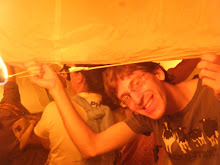Before I begin this analysis, I'd like to congratulate George on the publication of another one of his poems "The Bottom Lake" in the poetry magazine Smith's Knoll Issue 49.
Below the wood the tarn
"Tarn" is given a somewhat ominous feel by being the last word of the title and the first line of this poem. The setting brought to mind by this choice of word for a lake is of mountains in one of Britain's national parks, The Lake District, Snowdonia or in the Scottish highlands or islands.
as still as a hunter
The feeling of foreboding is confirmed by the simile in the second line. It seems likely that the hunter is a human deer hunter based on the likely location but it could be a comparison to an animal predator such as a cat.
waiting.
Separating "waiting" on to its own line gives a feeling that a long stretch of time passes while the hunter waits.
The doe in fog, a sodden net,
The deer is introduced together with another natural force. This metaphor identifies the fog as a fishing net and it is made more threatening by this human quality.
inches lower, dips her head,
As the doe "dips her head" she makes it vulnerable just as when a prisoner bows her head to the axe-man for execution.
ears stretched for steps, safety
The irony here is that the doe listens out for steps from human or animal hunters but assumes she has found "safety" at the end of the line when she hears none.
catches breaths.
This is a bit of difficult line to interpret because of the order of the words, but I think the purpose is to connect the idea of the deer catching her breath to listen for steps and the release of the withheld breath as the sense of safety catches hold.
Hooves as delicate as ladies' hands
At the end of the poem, Nosferatu is mentioned and the doe, with its "hooves as delicate as ladies' hands" could be seen as one of Count Dracula's wives.
grace mud, then press a grasp
Whereas the line starts with the barely there "grace" which makes even the mud the doe is stepping into seem beautiful, this alliterates with "grasp" at the end of the line which is synonymous with "clutch" and rhymes with the similar meaning word "clasp" and which, like those words, implies a firm hold from which the recipient would not easily get free.
so smooth, so welcoming.
There is no snapping of limbs from this predator but rather, its clutch is like a lover's embrace, so gentle that its prey does not realize the trap has already closed.
It's not until she's dipped her cloven
The word "cloven" while referring here to the doe's feet still succeeds in bringing to mind a dual image: first one of a heart cloven in two as the lover realizes she is betrayed; and second one of the Devil's hooves - an image of evil.
feet in deep that she feels the
The assonance of the long vowel sound "ee" in the words "feet", "deep" and "feels" serves to emphasize how deep the doe is trapped as well as to give voice to the doe's cries and the effort she must likely be expending as she struggles to free herself from the mud.
pull, and cannot leap.
The word "pull" suggests the lake has agency and is in the act of pulling the doe deeper as she struggles. The long vowel sound "ee" returns to add power to her "leap", but the doe's usual escape mechanism, which would be to jump out of her predators' grasp, is powerless here and the energy she expends on it is absorbed by the deep mud which pulls her still deeper.
For a moment in her fear she sees
That the doe sees a reflection in this moment suggests she becomes frozen in her fear and the water's surface becomes still like a mirror.
a doe beneath her, looking up,
The doe like a sheep would likely see her reflection as that of another deer.
one shoulder arched,
The doe's own arched shoulder, frozen in the motion of her attempted escape, takes on a sinister aspect in her mirror enemy.
like Nosferatu as she tugs.
One of the greatest fears we have of other humans is that they might wish to eat us. Nosferatu, or Count Dracula, is the embodiment of this fear. In a deer this seems even more unnatural as it never eats flesh. Once again it is a human, or at least a vampire, that the deer's arched nemesis is being compared to. It is this that lends the greatest threat to her situation in the reader's mind.

No comments:
Post a Comment